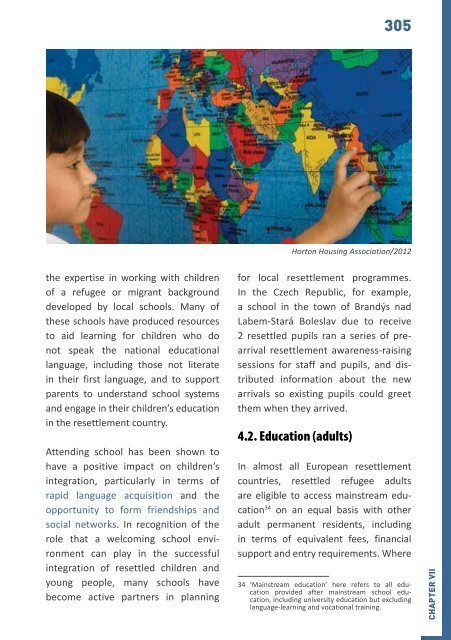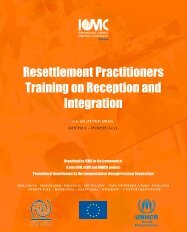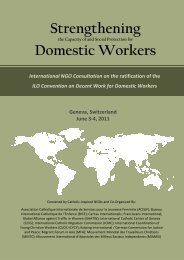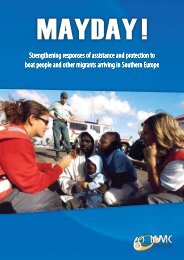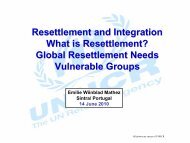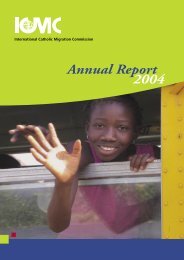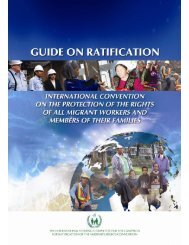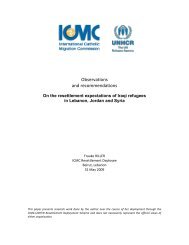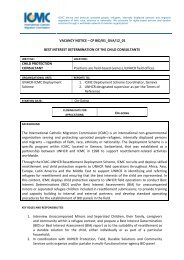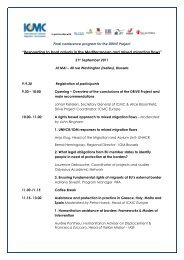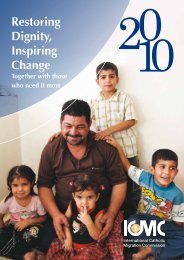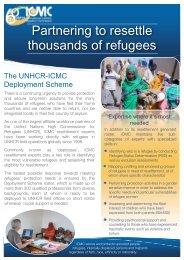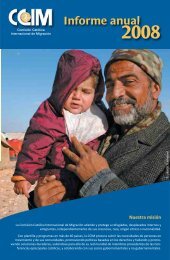- Page 1 and 2:
Welcome to Europe! A comprehensive
- Page 3 and 4:
Welcome to Europe! A comprehensive
- Page 5 and 6:
Acknowledgements 3 We would like to
- Page 7 and 8:
3.3. Burmese refugees in Thailand a
- Page 9 and 10:
Chapter VII - Building a new life i
- Page 11 and 12:
States have the primary responsibil
- Page 13 and 14:
11 CHAPTER II CHAPTER I Pakistani r
- Page 15 and 16:
Bangladesh is not a signatory to th
- Page 17 and 18:
2. RESETTLEMENT In practice, resett
- Page 19 and 20:
• Children and adolescents at ris
- Page 21 and 22:
19 CHAPTER II CHAPTER I in Iraq and
- Page 23 and 24:
1. UNHCR RESETTLEMENT OPERATIONS UN
- Page 25 and 26:
23 accounted for just 8% of global
- Page 27 and 28:
25 world. Partnerships between acto
- Page 29 and 30:
27 experts, who worked in twelve di
- Page 31 and 32:
29 Access to refugee populations in
- Page 33 and 34:
31 What can other resettlement coun
- Page 35 and 36:
33 Australia’s Special Humanitari
- Page 37 and 38:
35 At a glance • Population/GDP (
- Page 39 and 40:
37 What would be your advice to tho
- Page 41 and 42:
39 and required in US legislation.
- Page 43 and 44:
41 strong cases for changes to poli
- Page 45 and 46:
43 events, assist with translation
- Page 47 and 48:
45 In view of the large resettlemen
- Page 49 and 50:
47 ASIA TURKEY & MIDDLE EAST Afghan
- Page 51 and 52:
49 • access to education 15 (Zamb
- Page 53 and 54:
51 Mohammed, Somali refugee living
- Page 55 and 56:
53 Somali refugees being 458 days.
- Page 57 and 58:
55 deterioration in the asylum and
- Page 59 and 60:
3. ASIA AND PACIFIC 3.1. Afghan ref
- Page 61 and 62:
observers), the Contact Group works
- Page 63 and 64:
61 this period, the number of camps
- Page 65 and 66:
63 3.3.2. Burmese refugees in Thail
- Page 67 and 68:
65 ‘geographical limitation’, m
- Page 69 and 70:
67 durable solutions for recognised
- Page 71 and 72:
69 school system, but high rental c
- Page 73 and 74:
71 At the time of writing, UNHCR is
- Page 75 and 76:
Resettlement is a coordinated activ
- Page 77 and 78:
75 individual re-fugees’ living s
- Page 79 and 80:
77 from UNHCR Headquarters, and awa
- Page 81 and 82:
79 Chart B: Resettlement case submi
- Page 83 and 84:
81 submitted within 24 hours of ide
- Page 85 and 86:
83 the field office, resettlement c
- Page 87 and 88:
85 a dossier basis - where the deci
- Page 89 and 90:
87 made by UNHCR from 8,143 refugee
- Page 91 and 92:
89 Cases of individuals or groups t
- Page 93 and 94:
91 Preparing refugees to depart to
- Page 95 and 96:
93 and some programmes explicitly l
- Page 97 and 98:
95 Pre-departure assistance in Euro
- Page 99 and 100:
97 This chapter gives an overview o
- Page 101 and 102:
99 Hungary, Ireland, Lithuania, Lat
- Page 103 and 104:
In 2004, the Commission issued a Co
- Page 105 and 106:
103 contribution of EU Member State
- Page 107 and 108:
105 Directive’ 2004/83/EC 29 ) or
- Page 109 and 110:
for the period 2008-12 were offered
- Page 111 and 112:
109 • increasing the humanitarian
- Page 113 and 114:
For 2013, Germany, Hungary and Roma
- Page 115 and 116:
113 In order to initiate relocation
- Page 117 and 118:
115 related to relocation’ within
- Page 119 and 120:
117 • during the policy dialogue
- Page 121 and 122:
119 network-building activities by
- Page 123 and 124:
121 municipalities, and their civil
- Page 125 and 126:
123 The following country summaries
- Page 127 and 128:
125 Country Finland France Germany
- Page 129 and 130:
127 Country Norway Portugal Romania
- Page 131 and 132:
129 Belgium at a glance • Populat
- Page 133 and 134:
Belgium Resettlement Criteria • B
- Page 135 and 136:
133 Pre-departure Cultural Orienta
- Page 137 and 138:
Belgium counselling may be arranged
- Page 139 and 140:
• The new 2013 quota programme ma
- Page 141 and 142:
139 Year Accepted Arrivals 2010 47
- Page 143 and 144:
Czech Republic 141 by representativ
- Page 145 and 146:
Czech Republic 143 In-country selec
- Page 147 and 148:
Czech Republic 145 who refugees fro
- Page 149 and 150:
147 Denmark at a glance • Populat
- Page 151 and 152:
Denmark Denmark’s Resettlement Pr
- Page 153 and 154:
Denmark 151 medical cases are selec
- Page 155 and 156:
Denmark 153 In-country selection Se
- Page 157 and 158:
INTEGRATION IN FOCUS: Network famil
- Page 159 and 160:
Denmark 157 for employment and/or h
- Page 161 and 162:
159 Year Accepted Arrivals National
- Page 163 and 164:
Finland 161 the presence of support
- Page 165 and 166:
Finland 163 In-country selection Se
- Page 167 and 168:
165 also include short work placeme
- Page 169 and 170:
Finland Evaluations Although some e
- Page 171 and 172:
Year Dossiers submitted Accepted (N
- Page 173 and 174:
France 171 Identification and Selec
- Page 175 and 176:
Integration in Practice Reception O
- Page 177 and 178:
France 175 level of French is deeme
- Page 179 and 180:
France 177 so to date. 15% of the h
- Page 181 and 182:
179 Germany at a glance • Populat
- Page 183 and 184:
Germany 181 Resettlement Criteria B
- Page 185 and 186:
Germany 183 recognised refugees can
- Page 187 and 188:
Germany 185 resettlement of vulnera
- Page 189 and 190:
Germany Save Me activists from diff
- Page 191 and 192:
Strengths: Germany New Developments
- Page 193 and 194:
191 UNHCR Submission categories con
- Page 195 and 196:
Iceland 193 In-country selection Se
- Page 197 and 198:
Iceland 195 assist resettled refuge
- Page 199 and 200:
197 Ireland at a glance • Populat
- Page 201 and 202:
Ireland 199 • The primary applica
- Page 203 and 204:
Ireland 201 Dossier selection UNHCR
- Page 205 and 206:
Ireland services and support for re
- Page 207 and 208:
Ireland 205 Women and children at
- Page 209 and 210:
207 The Netherlands at a glance •
- Page 211 and 212:
The Netherlands The Netherlands’
- Page 213 and 214:
The Netherlands 211 both life in th
- Page 215 and 216:
The Netherlands Bhutanese children
- Page 217 and 218:
The Netherlands Afghan refugees in
- Page 219 and 220:
217 Norway at a glance • Populati
- Page 221 and 222:
Norway 219 UNHCR Priority levels ac
- Page 223 and 224:
Norway and must evidence completion
- Page 225 and 226:
Norway Integration in Practice Rece
- Page 227 and 228:
Norway 2013, and a total of 6,000 p
- Page 229 and 230:
227 Portugal at a glance • Popula
- Page 231 and 232:
Portugal Portugal’s Resettlement
- Page 233 and 234:
Portugal social profile of refugees
- Page 235 and 236:
Portugal phase. In Lisbon, they can
- Page 237 and 238:
Portugal Evaluations The Institute
- Page 239 and 240:
237 Romania at a glance • Populat
- Page 241 and 242:
Romania for resettlement to a third
- Page 243 and 244:
Romania Where they are arranged, 69
- Page 245 and 246:
Use of the European Refugee Fund (E
- Page 247 and 248:
245 Spain at a glance • Populatio
- Page 249 and 250:
Spain Criteria related to integrati
- Page 251 and 252:
Spain Integration in Practice Recep
- Page 253 and 254:
Spain Evaluations Spain first recei
- Page 255 and 256: 253 Year Accepted Arrivals National
- Page 257 and 258: Sweden appeal to governments to mak
- Page 259 and 260: Sweden In-country selection Selecti
- Page 261 and 262: Sweden refugees following activitie
- Page 263 and 264: Sweden downloaded from the project
- Page 265 and 266: 263 The UK at a glance • Populati
- Page 267 and 268: UK The UK’s Resettlement Programm
- Page 269 and 270: UK In-country selection UNHCR submi
- Page 271 and 272: UK refugee-landlords relationship f
- Page 273 and 274: UK Sheffield (and Hull), Bradford a
- Page 275 and 276: Other Countries Bulgaria Bulgaria:
- Page 277 and 278: 275 the Menedék Association, and t
- Page 279 and 280: Overview of reception and integrati
- Page 281 and 282: For abbreviations & acronyms see pa
- Page 283 and 284: For abbreviations & acronyms see pa
- Page 285 and 286: 283 For refugees, the 1951 UN Refug
- Page 287 and 288: 285 Fund (AMF) 2014-20 will unify t
- Page 289 and 290: 287 about refugees’ needs to supp
- Page 291 and 292: 289 It is therefore crucial that na
- Page 293 and 294: 291 considerably. In the UK, munici
- Page 295 and 296: 293 Some reception centres, such as
- Page 297 and 298: 295 civil society organisations pro
- Page 299 and 300: 297 Raising awareness about Save Me
- Page 301 and 302: 299 in resettlement, and wider init
- Page 303 and 304: 301 accommodation. Other programmes
- Page 305: 303 civic knowledge tests, and the
- Page 309 and 310: 307 pre-arrival information and pla
- Page 311 and 312: 309 The practices of Member States
- Page 313 and 314: 311 UNHCR Policy Development des Ev
- Page 315 and 316: 313 Council of the EU, Council Conc
- Page 317 and 318: 315 Report from the Commission to t
- Page 319 and 320: 317 Medical Needs Conditions for re
- Page 321 and 322: 319 Lack of Foreseeable Alternative
- Page 323 and 324: 321 integration and voluntary repat
- Page 325 and 326: 3 4 5 6 7 8 9 10 11 12 13 14 15 16
- Page 327 and 328: 325 Annex IV - Resettled refugees
- Page 329 and 330: Country Mandatory/ Voluntary Belgiu
- Page 331 and 332: 42 Autrement dit mardi 2 avril 2013


